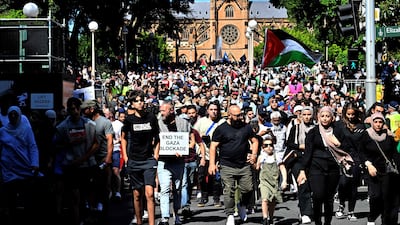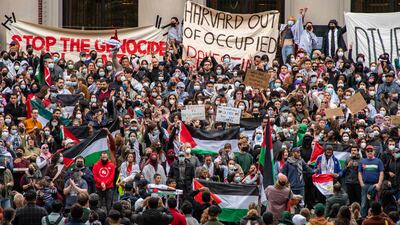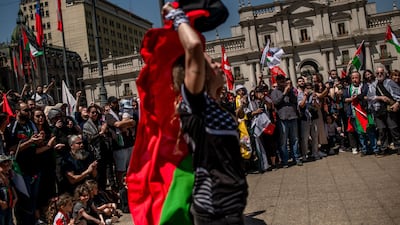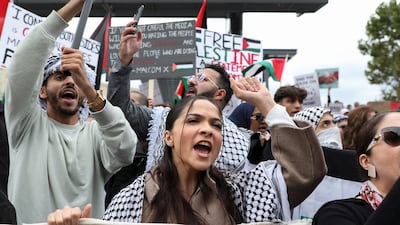Less than a month ago, Humza Yousaf was on the cover of Time magazine talking about his pride and the challenges of being Western Europe’s first Muslim head of government.
Since then, he has faced setbacks on the political front, including a bad loss to the Labour party in a by-election. Gaza has not only been searingly personal for him, it demonstrated just how his background does indeed bring a vastly different lived experience to the corridors of power.
Mr Yousaf is Scotland’s First Minister, and his parents-in-law are currently in Gaza. The couple live in Dundee and were visiting with family who live there, including the family matriarch aged in her 90s and their son, who is a doctor.
As Mr Yousaf posted on social media to circulate videos of his mother-in-law Elizabeth, he was asking the UK government of Rishi Sunak to use its friendly ties with Israel to address the plight of those trapped in Gaza.
Scotland is not an independent country and Mr Yousaf has no foreign affairs powers. But his letters and calls have had no reply from the UK government.
If someone in a position of power feels so excluded from a voice, how many other millions are helpless and desolate as a result of how the government is shaping its response to the siege of Gaza?
It is worth noting that Mr Yousaf is also the only government leader who has condoled personally with the family of a victim of the Hamas attacks on October 7. He told mourners for Bernard Cowen at Giffnock Newton Mearns Synagogue: “Your grief is my grief.”
While Mr Sunak did say on Friday that the safety of civilians should be “paramount in our minds”, his government has consistently messaged its support for Israel’s right to defend itself. Its priorities are pretty clear. As retired ambassador Richard Dalton said last week, ministers had departed from the playbook for UK foreign policy over decades of conflict and jettisoned previous balances. In other words, its determination to avoid false equivalence is new and overriding.

Mr Yousaf is not only experiencing personal pain but the loneliness of a politician shunned and not given a hearing.
In this, however, he is not alone. Beyond the UK, the European landscape is much the same. Mr Yousaf represents a stream of opinion that is passionate about the humanitarian needs for restraint.
European leaders such as French President Emmanuel Macron and European Commission President Ursula von der Leyen have expressed absolute support for Israeli Prime Minister Benjamin Netanyahu’s response to the Hamas attacks for “weeks to come”.
One commissioner rushed to declare that the EU would cut off aid funds for all Palestinians, leading to absolute furore among the member states who had not been consulted. One Irish diplomat told me last week she’d been aghast at the announcement. “I just wondered where that was coming from,” she confided. “It wasn’t from the members, and it certainly wasn’t our position.”
EU foreign policy chief Josep Borrell was quick to react to the aborted proposal of cutting aid. He issued a statement on co-signed by the EU and the GCC, calling for “restraint and the release of hostages, allowing access to food, water and medicines according to international humanitarian law”. He also stressed the need for sustained financial support for the UN relief agency for Palestinians.
A separate justification from European Council President Charles Michel for the bloc’s stance reinforced the impression that policy is being driven by self-interest and not wider considerations of international law and humanitarian violations.
“Look, if there would be more difficulties at the regional level, we would have immediately huge difficulties on the European soil because of the refugees,” Mr Michel said in an interview. “And we know how it can be used by some political groups within the EU to fuel some controversies and to make the EU more fragmented.”
The problem for the Europeans in pursuing its approach is that the bloc could be discounted as a paper tiger in this crisis and those to come. For Middle East diplomats who spend a great deal of time listening to European requests, the demands for fairness are only travelling in one direction.
For a long time, there has been clearcut expectations of what America would do. To a similar extent, there is not much of a surprise in the Russian and Chinese positions. Europe’s fluidity makes it something of a swing factor in the international response, something that practically enhances its importance.
How the international actors establish themselves will have a lasting legacy as this crisis will play out.
Europe is divided and these divisions are already detectable. In fact, they have already robbed the Europeans of that vital whiff of combined heft.
Mr Yousaf has said he does not know if he will see his relatives again. Everybody knows now that he has done his utmost. That platform that he spoke about to Time Magazine has allowed him to bring his voice to the public. Across Europe, there are many others who represent the views that align with his own heartfelt experience.
As the head of an autonomous authority, and not a national government, Mr Yousaf is constrained by the constitutional limits of his position. But that has not diminished his voice.
The struggle between the two streams will continue to shape how Europe reacts. It has already limited the push to place a sole focus on Israel’s defence needs. And it will keep the pressure on the European leaders in the days and weeks to come.













